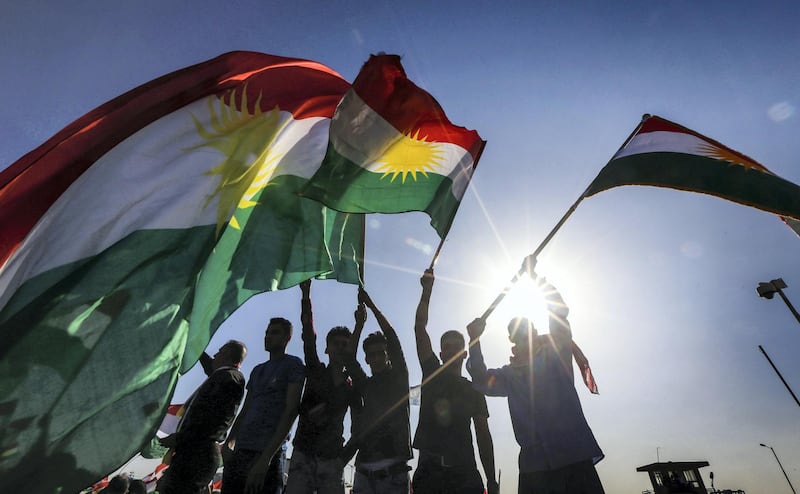When invading US troops toppled the statue of former strongman Saddam Hussein on April 9, 2003, they were cheered on by the country's Kurds, who had high hopes for a brighter future in Iraq.
“I don’t remember anyone talking about an independent Kurdistan then,” recalls Khogir Wirya, a research fellow specialising in conflict resolution at the Erbil-based Middle East Research Institute. “A prosperous, rich powerful Iraq was what was in the minds of people.”
Fifteen years later, Kurds want independence. But after a thwarted referendum last September, their aspirations to statehood have been set back a generation.
Ordinary Kurds are less optimistic about the future, even as leaders insist an opportunity exists to reset relations with Baghdad.
A Kurd from the disputed oil-producing city of Kirkuk, Mr Wirya was a teenager in 2003 and recalls watching the US invasion on staticky television from illegal satellite channels. “After the war the famous expression was that ‘the gates of Kirkuk will be made of gold’.”
Instead, he found himself growing up in a city that became synonymous with sectarian tension, and recalls watching militants firing rockets from outside his window.
Today he's lunching outside at a cafe in an area of the Kurdish capital surrounded by modern high-rise apartments. It's a scene that is unfamiliar in much of Iraq, a result of the autonomous Kurdistan Region's enviable security situation.
After the invasion, the Kurds — long persecuted by Saddam — joined up with US forces. To this day they remain proud that until the war against ISIS no American serviceman had been killed in Kurdish territory. For years this security attracted investors, while the rest of Iraq remained mired in violence.
The Kurds also participated in Iraq's post-Saddam government — negotiating shrewdly to enshrine their autonomy in the 2005 constitution. But insecurity and entrenched political sectarianism made the Kurdistan Regional Government (KRG) look to independence.
“When the security situation deteriorated, and the rivalry between Baghdad and Erbil in the disputed territories began, [Kurdish] people realised that loads of the insurgency was coming from Arab areas,” Mr Wirya says. “That’s when people started talking about secession.”
The largest of the insurgent groups was ISIS, which in 2014 came within 30 kilometres of Erbil.
Long-standing Kurdish leader Massoud Barzani hoped the Kurds' role as a stalwart ally against ISIS would attract support for an independence referendum. "We would prefer to die of starvation than to live under the oppression and occupation of others," the president at the time said.
_______________
Read more:
Iraq sends money to pay Kurdish salaries for first time since 2014
Iraqi Prime Minister reopens Kurdish airports to international flights
Beyond the Headlines Podcast: Saddam Hussein's downfall, 15 years on
Iraqi budget cut raises tensions with Kurdish region
_______________
But the referendum — opposed by federal Iraq, its regional neighbours and the US — backfired spectacularly.
Baghdad moved to reclaim disputed territories, including crucial oilfields upon which the economic feasibility of Kurdish secession was set to rest. In October the Iraq Civil Aviation Authority closed Kurdish airspace, a humiliating measure for the Kurds and an inconvenience for international companies, NGOs and the 34 countries with a diplomatic presence in the Kurdish entity.
The failure of the referendum set back independence aspirations at least two decades, the Kurdish opposition Gorran Movement believes. “After 2003, the balance of power was in our favour,” said Hoshyar Omar Ali, head of diplomatic relations for Gorran. “But the fallout from the referendum has weakened the KRG vis-a-vis Baghdad, vis-a-vis our neighbours, and vis-a-vis our allies.”
Gorran opposed the timing of the referendum, arguing Kurdistan was not ready for independence. “In our view you don’t declare a state, you build a state,” Mr Ali said. “That involves buildings institutions, building a diversified economy and a military that can defend its borders.”
Mr Ali believes the referendum was a distraction from pressing economic issues. "The priority for the people was the fight against ISIS so they remained silent even though they faced very difficult conditions," he said.
Now though, ordinary Kurds are less reticent about expressing frustration with a government that has failed to deliver either independence or economic prosperity.
"The government is stealing our salaries," said Sohail Ismail, a teacher at a recent protest in Erbil. It's a common refrain among Kurds who believe that government corruption is endemic.
"My salary is $250 and I've been a teacher for 15 years," she said. "At Newroz [Kurdish new year in March] they paid us for November. And they tell us we must be patient! We don't need this loser authority."
The two dominant parties in the KRG appear to be in disarray. Mr Barzani, the head of the Kurdistan Democratic Party stepped down last year after 12 years as Kurdistan's president. The Patriotic Union of Kurdistan leader and Iraq's first post-2003 invasion president Jalal Talabani died last year.
Credit is due to Iraqi Prime Minister Haider Al Abadi for making some attempts at statesmanship, Gorran says. In talks with other groups in Iraq, Mr Ali sees there is an understanding that “we cannot go on like the old days”.
“There are opportunities right now to undertake political and economic reforms,” he said. “That is what the people of Iraq and the people of Kurdistan deserve.”





